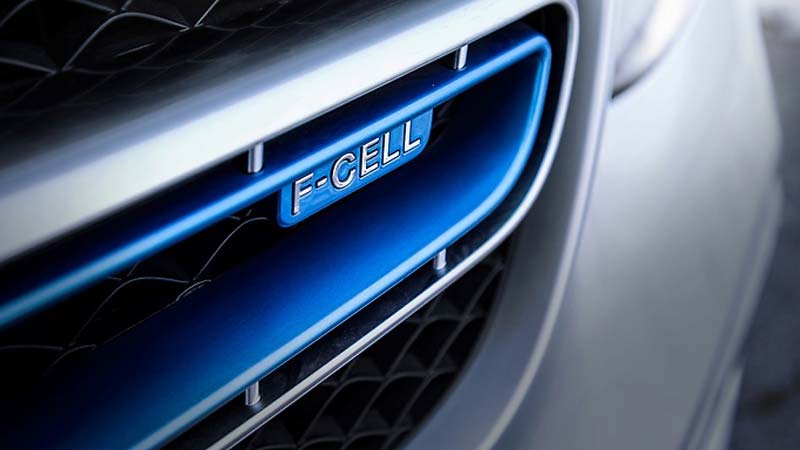Two of Europe’s leading automotive giants in the field of commercial vehicles – Daimler Truck AG and the Volvo Group – have this week committed to work together to develop, produce, and commercialise hydrogen fuel cells for heavy-duty vehicle applications.
Daimler and Volvo announced on Tuesday the formation of a new 50/50 joint venture intended to pave the way for greater use and commercialisation of hydrogen fuel cells in the heavy-duty vehicle industry.
Specifically, the new JV will operate as an independent and autonomous entity in a move the companies believe will decrease development costs for both companies while accelerating the market introduction of fuel cell systems in products for heavy-duty and long-haul transport.
Daimler, specifically, has recent history and experience in the development and use of hydrogen fuel cells thanks to its work on the Mercedes-Benz fuel cell over the past two decades.
Daimler will subsequently fold all its current fuel cell activities into the new joint venture, while the Volvo Group will acquire 50% in the joint venture for approximately €600 million ($A1.03 billion) on a cash and debt free basis.
“Transport and logistics keep the world moving, and the need for transport will continue to grow,” said Martin Daum, board chair at Daimler Truck AG and board member Daimler AG.
“Truly CO2-neutral transport can be accomplished through electric drive trains with energy coming either from batteries or by converting hydrogen on board into electricity.
“For trucks to cope with heavy loads and long distances, fuel cells are one important answer and a technology where Daimler has built up significant expertise through its Mercedes-Benz fuel cell unit over the last two decades.
“This joint initiative with the Volvo Group is a milestone in bringing fuel cell powered trucks and buses onto our roads.”
Included in Daimler’s plans to bring together all its group-wide fuel cell activities into one new Daimler Truck fuel cell unit is the inclusion of its Mercedes-Benz Fuel Cell GmbH –Daimler’s subsidiary company responsible for the research and development in the field of fuel cell systems.
Boasting an inter-disciplinary and highly specialised staff of over 200, the Mercedes-Benz Fuel Cell GmbH is headquartered in Nabern, Germany. The new joint venture will include the operations at Nabern as well as production facilities in Germany and Canada.
The path to Daimler’s focus on hydrogen fuel cells can, at least in part, include the announcement in October of last year that it would end the use of diesel engines in heavy duty vehicles over the next two decades, promising instead “CO2 neutrality” for new vehicles by 2039 in the European, Japanese, and North American markets.
“Having CO₂-neutral transport on the road by 2050 is our ultimate goal. This can only be achieved if competitive conditions for CO₂-neutral transport are created for our customers in terms of costs and infrastructure,” Daum said in an October press release.
Volvo, on the other hand, is throwing its weight around behind both hydrogen fuel cells for heavy duty vehicles as well as electric options.
In February, Volvo Trucks offered a first look at its North American Class 8 battery-electric project trucks, providing an exclusive look at a pilot program in California which will see Volvo VNR Electric project trucks put into real-world commercial operations with two of the state’s leading freight companies – Dependable Supply Chain Services and NFI.
“Electrification of road transport is a key element in delivering the so-called Green Deal, a carbon neutral Europe and ultimately a carbon neutral world,” said Martin Lundstedt, Volvo gGroup president and CEO of the new JV agreement with Daimler.
“Using hydrogen as a carrier of green electricity to power electric trucks in long-haul operations is one important part of the puzzle, and a complement to battery electric vehicles and renewable fuels.
“Combining the Volvo Group and Daimler’s experience in this area to accelerate the rate of development is good both for our customers and for society as a whole. By forming this joint venture, we are clearly showing that we believe in hydrogen fuel cells for commercial vehicles.
“But for this vision to become reality, other companies and institutions also need to support and contribute to this development, not least in order to establish the fuel infrastructure needed.”
RenewEconomy and its sister sites One Step Off The Grid and The Driven will continue to publish throughout the Covid-19 crisis, posting good news about technology and project development, and holding government, regulators and business to account. But as the conference market evaporates, and some advertisers pull in their budgets, readers can help by making a voluntary donation here to help ensure we can continue to offer the service free of charge and to as wide an audience as possible. Thankyou for your support.
Joshua S. Hill is a Melbourne-based journalist who has been writing about climate change, clean technology, and electric vehicles for over 15 years. He has been reporting on electric vehicles and clean technologies for Renew Economy and The Driven since 2012. His preferred mode of transport is his feet.


